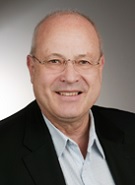While Atlas Venture was busy putting together a syndicate for Raze in Cambridge, MA, the venture group was also engaged in hatching a $32 million round across the Atlantic in the scientific hotbed of Cambridge, UK. Atlas partnered with SV Life Sciences and three corporate venture arms--Novartis ($NVS) Venture Fund, GlaxoSmithKline's ($GSK) SR One and Astellas Venture Management--to back Bicycle Therapeutics.
 |
| Bicycle CEO Rolf Gunther |
"Atlas was one of the founding investors," says CEO Rolf Gunther, who is building the company on a scientific foundation provided by Christian Heinis and Sir Greg Winter, the high-profile scientist at Trinity who founded Domantis and Cambridge Antibody Technology, one of the legends of the U.K. biotech industry which was acquired by AstraZeneca ($AZN). Domantis was bought out by GlaxoSmithKline.
This time Winter and his colleagues are targeting a big improvement over the classic antibody therapeutic, which Winter helped establish. They're working on a new class of drugs called bicycle peptide drug conjugates that are 100-fold smaller than antibodies. These bicycle peptides are short peptide sequences which are "constrained by a chemical scaffold core to form a structure with two loops of amino acids," says the company, offering a structure that provides high stability and high affinity binding to targets.
"The significance of the size is several," says Gunther. "First you have a fast penetration through the tissue to tackle tumors, particularly solid tumors. During in vivo studies, the speed of tumor penetration and the amount of bicycles taken up into tumors was higher than antibodies." And that speaks well to its therapeutic punch.
This second round of cash for Bicycle gives the biotech enough money to select a candidate by the end of this year, start IND enabling studies and get the first program into a Phase I/II by mid-2017, with a second candidate entering the clinic soon after. And they should have the resources needed to get to clinical proof of concept on both.
When you've set out to develop a new class of drugs with broad applicability, there are also plenty of opportunities to strike partnership deals as well. Bicycle already has one pact with ThromboGenics in opthalmology. "Other discussions with partners are at term sheets," he adds, with at least one new deal likely to follow by the end of the year.
Gunther notes that when you have a scientist of Winter's renown behind the company, deals are much easier to strike.
"It's the power of the scientists," he says.
- here's the release (PDF)